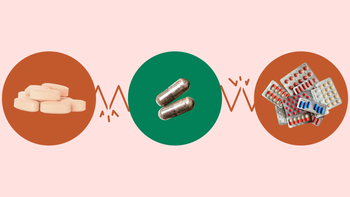
Activated Charcoal: Uses, Benefits, and Myths
Key takeaways:
Activated charcoal is best used to reverse certain overdoses or types of poisoning.
In recent years, activated charcoal has become a popular ingredient in many health and wellness products. But it doesn’t offer many science-backed benefits to these products.

Over the past few years, activated charcoal has attracted quite a bit of attention in the media. It’s a substance that may effectively treat and reverse some types of poisonings. And it’s commonly used for this purpose in emergency rooms across the U.S.
But activated charcoal has also been touted by some as a beneficial ingredient or supplement in many health and wellness products. Today, it often appears in products like teeth whiteners, face masks, and detox drinks.
Is there any evidence that activated charcoal can do more than treat poisonings or overdoses? Here, we’ll talk about what you need to know about activated charcoal — what it is, its potential benefits, and side effects to watch out for.
Search and compare options
What is activated charcoal?
Activated charcoal — also known as activated carbon — is a black powder made from carbon sources, like wood or coconut shells. It’s “activated” after these materials are exposed to high temperatures and certain gasses.
Activated charcoal may be able to help if you swallowed a poison or too much of a medication. It can attach to a poison or medication in your digestive tract. In doing so, it helps the substance leave your body through your stool.
Activated charcoal and overdose
Activated charcoal has been used for centuries to remove ingested toxic substances from the body. And, as mentioned, it’s still used in emergency departments to counteract the effects of an accidental poisoning or medication overdose.
It may be used if a poison or medication is sitting in the stomach and hasn’t entered the bloodstream. The sooner activated charcoal is taken, the better it works — generally within 30 to 60 minutes.
But activated charcoal isn’t recommended for the treatment of overdoses involving substances like:
Alcohol
Substances containing metal (e.g., iron, lithium)
Caustic substances, or substances that cause burns when touched or swallowed (e.g., household cleaners, gasoline, paint thinner)
Any substance that has been injected into the bloodstream or under the skin
Read more like this
Explore these related articles, suggested for readers like you.
Does activated charcoal have any benefits beyond the emergency room?
Activated charcoal is commonly found in health and wellness products and supplements, which we’ll cover in more detail later. But there’s not much evidence that activated charcoal is effective for uses outside of the emergency room. There are, however, a few situations in which activated charcoal might be beneficial.
Gas and bloating
Activated charcoal might help with symptoms of gas and bloating, but there isn’t a lot of research to support this. A few small studies suggest it may help by reducing the amount of gas produced by the colon.
A recent study showed that a supplement containing activated charcoal significantly reduced constipation and bloating. But the supplement also contained other herbs that may have digestive benefits. So it’s difficult to say whether activated charcoal on its own helps with indigestion symptoms.
In fact, other studies suggest it doesn’t make a difference. Further research is needed to validate this claim.
Kidney disease
In kidney disease, the body has trouble filtering out waste products and excess substances. Some studies show that activated charcoal may help eliminate these toxins, but more studies are needed.
If you have kidney disease, it’s important that you don’t start taking any new supplements — including activated charcoal — without talking to your kidney specialist first.
Water filtration
Activated charcoal is occasionally used for water filtration. A water filter that has activated carbon (charcoal) can help remove certain chemicals from water before you drink or use it.
But while activated carbon water filters can help improve the taste and quality of water, they don’t get rid of all possible chemicals or germs.
Which activated charcoal products are mostly just media hype?
Health trends and marketing in recent years have made activated charcoal products relatively popular. Personal care products containing activated charcoal — like toothpaste, soaps, and deodorants — focus on the idea that activated charcoal can draw out impurities. But there is little-to-no research proving small amounts of activated charcoal (alongside other ingredients) in these products are actually effective — especially for products applied to your skin.
Here’s what we currently know about some of these products.
Hangover prevention
Many online resources claim that activated charcoal can potentially prevent hangovers if taken before drinking. However, activated charcoal isn’t a hangover remedy. And unfortunately, there aren’t any helpful options to prevent hangovers.
The best way to prevent hangovers is to limit or control the amount of alcohol that you drink.
Toothpaste and teeth whitening
Many toothpastes and other oral care products contain activated charcoal. It’s marketed as a way to help whiten and clean your teeth.
It's hard to say if these products work to whiten teeth. Some studies say they do, but not more than traditional toothpastes. More research is needed to support the claims that these products make.
There’s also a potential problem with using these products: Charcoal can wear down tooth enamel and bind to fluoride, which is a mineral essential for strong teeth. That’s why it’s best to stick to a whitening toothpaste that’s recommended by the American Dental Association (ADA).
Face masks and skin cleansers
Skin care products, like face masks and skin cleansers, may also be enhanced with activated charcoal. Although they likely won’t cause any problems, they probably won’t work any better than skin care products that don’t have activated charcoal.
But charcoal masks products that contain glue have been found to cause scarring and peeling. And some charcoal skin products may have unknown ingredients that can cause skin irritation.
If you’re looking for a solution to certain skin conditions, speak to a dermatologist.
Shampoo
Some shampoos and other hair care products contain activated charcoal. The claim is that these products help remove oil and dirt from hair.
So can it? Until research studies can back up these claims, we won’t know for sure.
Is activated charcoal safe?
Activated charcoal is usually safe to use. But that doesn’t mean it’s free of any risks. Its safety depends on how it’s used. Risk levels depend on if it’s swallowed or if it’s applied to the teeth, skin, or hair. Here are the main risks of consuming activated charcoal:
1) Rarely, it can go into your lungs instead of your stomach. In the lungs, it can cause severe irritation and inflammation (aspiration pneumonitis).
2) It can prevent your body from digesting food and absorbing nutrients.
3) It can make medications and supplements less effective.
What are potential side effects of activated charcoal?
Like all medications and supplements, activated charcoal has a risk of side effects. Side effects of swallowing activated charcoal may include:
Vomiting
Diarrhea
Constipation
Bowel obstruction
Does activated charcoal have any drug interactions?
Yes — certain medications or supplements you may be taking can interact with activated charcoal. Some examples include:
Birth control pills (oral contraceptives)
Leflunomide (Arava)
Teriflunomide (Aubagio)
Multivitamins
If you take activated charcoal supplements and medications, speak to your healthcare provider or pharmacist. They can help you decide if the combination is safe. If needed, they can also help you come up with a way to space out taking your medications from activated charcoal supplements and products.
Activated charcoal food interactions
Certain foods and drinks — like milk, marmalade, and chocolate syrup — can make activated charcoal less effective.
However, certain foods and drinks may also be infused with activated charcoal. There isn't any research yet showing that these foods detoxify the body or have any other health benefits.
The bottom line
Activated charcoal has a place in the medical world. But consumer products, foods, and drinks containing activated charcoal are not proven to have any medical benefit. Always discuss with your healthcare provider, pharmacist, or dietician if you’re thinking about adding activated charcoal to your diet or personal care routine.
Why trust our experts?































